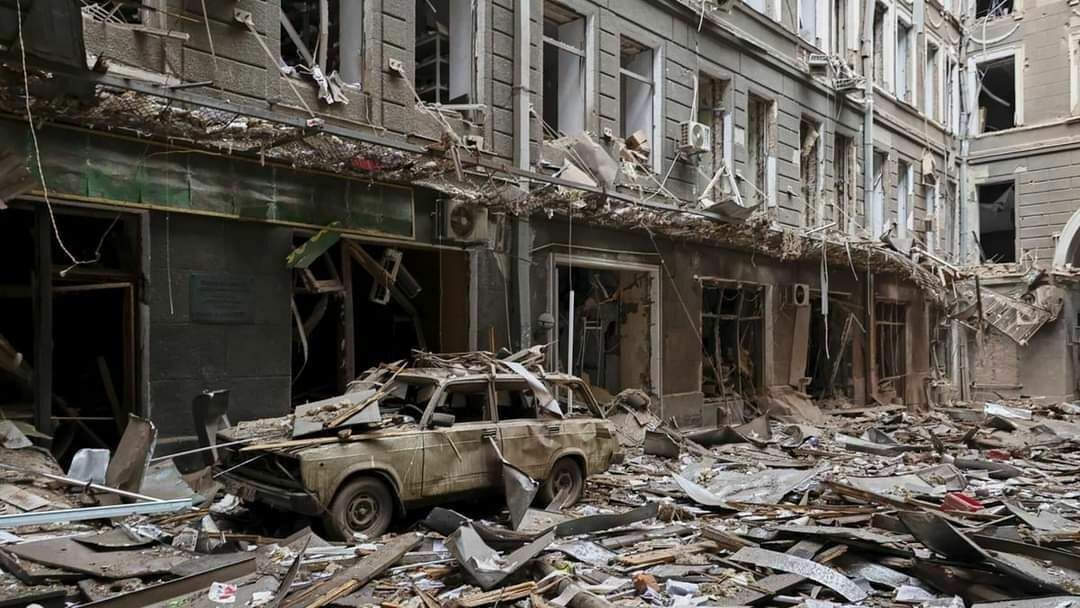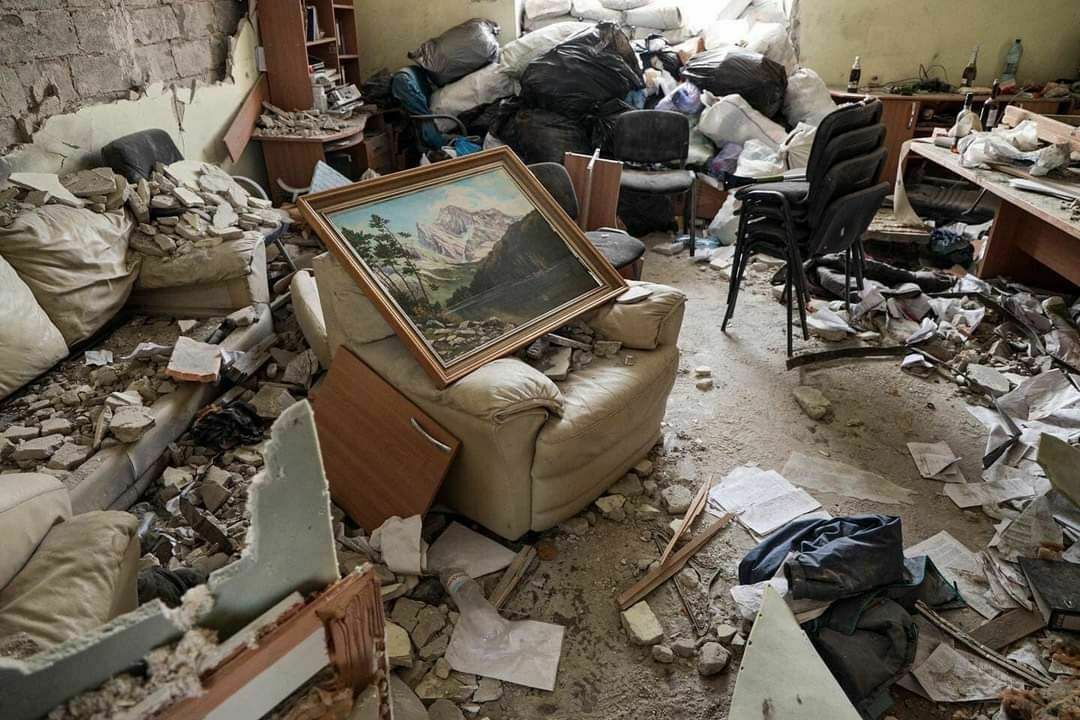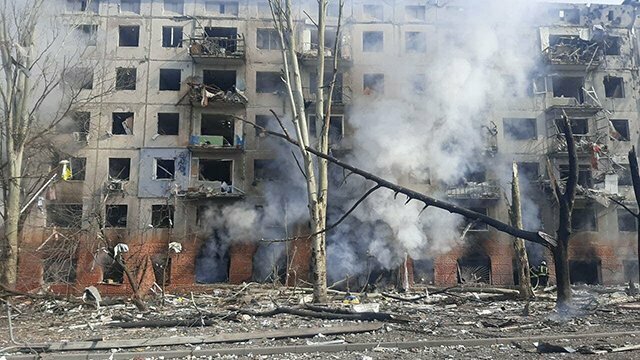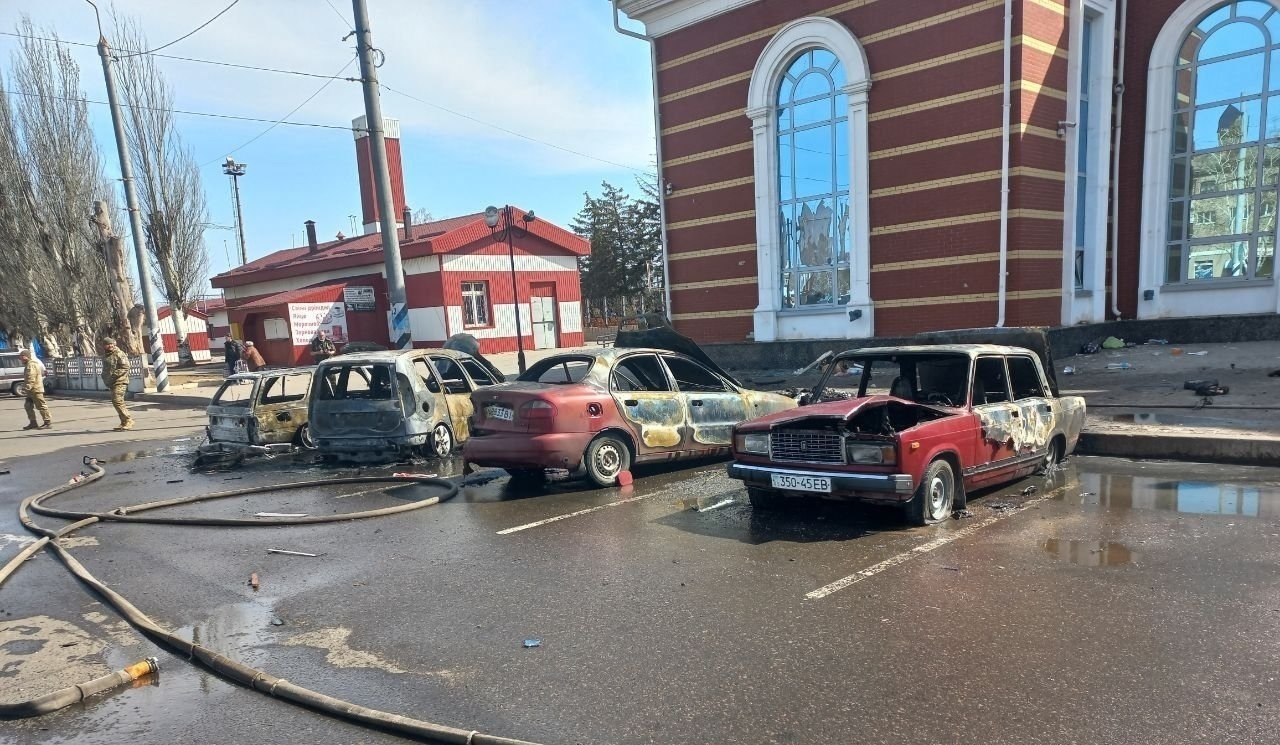Don’t believe it when they say everyone in Kharkiv is Russian. We are Ukrainians! We are just fluent in the language of the enemy!
Stories of two women from Kramatorsk and Kharkiv who moved to Lviv while their husbands are fighting for victory on the front lines.
Text by: Dmytro Syniak
They do not look shocked or frightened, although a few days ago they were still going through hell. “We have been used to war since 2014,” they say. “We have not stopped helping our army and resisting the occupation since.” The women asked not to give their last names because the husband of one of them is a well-known person awarded the title of Hero of Ukraine, who has taken up arms to repel the Russian aggression. And the husband of another is his friend, a Kramatorsk businessman and volunteer. During the heaviest shelling, Natalia was forced to stay under air strikes and shelling in Kharkiv because her daughter-in-law had undergone a complex surgery the day before the war.
Natalia. Under air strikes in intensive care
As it happens, my daughter-in-law, Yulia, had a stroke, and on February 23 she underwent a craniotomy in Kharkiv to remove the aneurysm. When Yulia was discharged, the doctor and I had already become family because we had gone through so much together…
On February 24, I spent the night in my son’s apartment in Saltivka, on the 12th floor. It has panoramic windows overlooking Belgorod. At 5 a.m., my son and I heard explosions and saw black mushrooms of smoke rising from the explosions on the horizon. We thought that this was an act of sabotage, that there could be no war. We packed our bags and rushed to my daughter-in-law at the hospital. Huge queues lined up around the gas stations as everyone fled Kharkiv in their cars. A thunder of explosions roared over the city without respite.
Loads of rumours circulated around the hospital. “The Russians are here!” “We saw tanks there!” We avoided saying anything to Yulia as worrying her was strictly prohibited. Then I stopped noticing the passage of time. Now I can’t even say how many days we stayed in Kharkiv.
I remember when my son said, “Don’t go anywhere, there will be an air raid!” At first, no one believed him, but then everyone rushed to grab gurneys with patients and get to the ground floor. Doctors are heroes. They did not run away but saved the patients, moving them along with drips and complex equipment. In three hours, everyone calmed down a bit and returned to the wards, although the artillery shelling of the outskirts of the city did not subside. Bombs—cluster bombs—rained on Kharkiv that evening.
Later, every day during the air raids, we took my daughter-in-law from the intensive care unit to the corridor to hide behind thick walls. She didn’t understand anything, and when she heard the explosions and asked us what was happening, we made up some nonsense, saying that someone was closing the door loudly, that something was being repaired there, that a tram was heard outside and so on.

Hundreds of houses in Kharkiv were destroyed as a result of the Russian bombing
All the shops in Kharkiv were immediately emptied, and my son spent entire days wandering around the city looking for food. Once he saw a grocery store with broken glass. He called the owner of the store, having learned her phone number from a job ad on a nearby wall. The owner said she knew about the broken glass and asked him to enter the store and take out the fuses. The son did this and then asked whether he could take some products and credit the money for them to her bank account. The woman agreed, but while they were talking, several more people came into the store. They also asked for the owner’s account number and started transferring money to her for products that were quickly swept from the shelves.
There was this time when my daughter-in-law suddenly told my son, “I’m craving blueberry yoghurt. Swing by the supermarket and get some!” What a challenge! Fortunately, he was helping out at the hospital all this time, so he made friends with local volunteers. They got him that yoghurt.
Once, in a long queue at the supermarket where my son stood waiting for more than an hour and a half, an old woman launched into a loud talk about ‘Russians who will now save everyone’. People almost tore her to pieces, they were so furious. The woman’s son came, but he barely managed to pick her up and do a runner. Don’t believe it when they say everyone in Kharkiv is Russian. We are Ukrainians! We are just fluent in the language of the enemy.
My relatives from Russia called and advised me against watching ‘fascist-populist-Banderite propaganda.’ Listen, I know nothing about Bandera, but judging by the reaction of the Russians, he did a lot of good. I will definitely read up on him now. I told my Russian relative, “Do you know that Russia is bombing our cities?” “Quit your Banderite propaganda!” he said. You just can’t prove anything to him. I send him all the photos of the shelling, send our billboards with the message to the Russian warship.

Russians do not want to believe that their army is destroying residential buildings and killing civilians in Ukraine
My mother, who lives in Pokrovsk, had troubles finding her medication, and this relative found out about it. Suddenly yesterday he advised my sister, “Go ask our soldiers, they will help you!” I sent him a video of our army destroying Russian soldiers, of them fleeing across the field. “Are you suggesting we ask these soldiers?” I asked. He did not answer.
My colleague’s parents live in Luhansk. They call her from there. “How are you?” they ask. “On our way to the bomb shelter,” she replies. “What are you talking about! No one will fire at civilians! Stay at home!” They are simply impenetrable.
My daughter-in-law was in the hospital for almost two weeks, and then we took her to a village near Kharkiv. On the way, she realised that some military action was underway, because she saw a burned Russian tank. “Let’s go at least kick it!” she suggested immediately.
As for me, I work in the Department of Social Services of the Kramatorsk City Council. I went to work for a few more days under fire, but then we decided to leave. At the station, we boarded the evacuation train, which was going to Khmelnytsky. We barely got into the car; its windows were curtained. And here we are in Lviv. We believe in victory, but we are very worried about what will happen. I believe that in 2014, Russia had a chance of seizing Ukraine, but not anymore.
Oksana. The second war
My daughter and son-in-law worked in China for 2.5 years, and they asked me to buy them an apartment in Kharkiv for the money they earned there. On February 22, I rented this apartment to a young woman. At that time, Putin had already announced the recognition of the so-called DPR and LPR. Naturally, we discussed it with her. “War is terrible!” I told her. “I know it; I saw the war!” But the real estate agent then waved me off. “I don’t think they will go to Kharkiv!” she said. However, I did not think in 2014 that the Russians could capture Kramatorsk. I still remember how our city was shelled with Smerch rockets. I couldn’t walk 50 meters to the house after that because my knees buckled… The Armed Forces liberated Kramatorsk on July 5. Since then, everyone remembers the battles for Sloviansk, but they were no less fierce in Kramatorsk.
After I rented the apartment, I went to Kramatorsk. I could not sleep that night, perhaps due to a sense of foreboding. When I heard the explosions at 5 a.m., I decided that the Russians were attacking Ukraine from the DPR. I immediately called my tenant, but she was shocked and speechless. Later, she managed to say that she was urgently going to Lviv. I asked her to turn off the electricity, gas and water and hurried to the volunteer centre to make Molotov cocktails with my husband. About thirty of us gathered there. We worked as an efficient team, and the mood was sober. We did it for five days.

Russians shelled Kramatorsk in 2014 and 2015. Kramatorsk is again under fire in 2022.
My husband and I have been working at this volunteer centre since 2014: we have been weaving camouflage nets there for eight years. However, many residents of Kramatorsk remained pro-Russian ‘vatniks’. I am a kindergarten teacher. In 2014, only three out of more than fifty kindergarten employees were pro-Ukrainian. No argument of mine could change their mind. At that time, they were all fans of those ‘apalchentsy’, their so-called ‘rebel boys’ from the occupied territories. Now that the shelling had begun, I ran to the corridor to hide behind two walls. All the teachers and children have already gathered there. At the sound of explosions, one of the teachers said, “This is probably our soldiers firing!” “Which our soldiers?” I asked. “What do you mean? Ours, Ukrainians!” “I’m just asking to make sure,” I said, “because in 2014, you and I had different ‘ours’.” And no one dared to say anything.
I have another story, this one about our neighbour, a die-hard vatnik. On February 24 he came up to us while we were out. “Guess what? Glory to Ukraine!” In short, our people have seen the light, but at what cost!
When the shelling intensified, we decided to go to relatives in Lviv. The recent shelling of the Kramatorsk railway station proved that we did everything right. The Russian army has neither compassion nor conscience. All those who, in one way or another, were involved in the development of Ukraine, volunteering, protecting its borders, will be killed in the occupied territories. The brutal massacre of people in Bucha has shown that it is impossible to live under Russia. Those who survived the occupation of Kramatorsk in 2014 should know this. Ukraine has no choice; it must fight for its existence. That is why we do not flee abroad while our men are fighting for our country, each in his own way. We will definitely find something to do in Lviv to bring our victory closer.

Russians shelled Kramatorsk railway station: over 50 people were killed, 5 of them children
Tags:
Область:
Харківська областьГромади:
Харківська територіальна громадаSource:
Пресцентр ініціативи "Децентралізація"
19 December 2025
Locally-led Recovery Planning: How Polaris Strategic Sessions Work
Locally-led Recovery Planning: How Polaris...
The Polaris Programme continues to provide systematic support to hromadas under its Locally-led Recovery sphere. In...
19 December 2025
Boryslav City Council approves new Community Charter
Boryslav City Council approves new Community...
Today, on 18 December, the Boryslav City Council made a historic decision by approving the Charter of the Boryslav...
19 December 2025
Public Finance for Children (PF4C) Ukraine's State Budget 2026 Overview
Public Finance for Children (PF4C) Ukraine's...
UNICEF Ukraine has prepared a brief overview of Ukraine’s State Budget for 2026, with a focus on financing for social...
19 December 2025
Питання релокації пожежно-рятувальних...
“Велика війна” зумовлює не завжди очевидні виклики для територіальних громад. Хоча законодавчі органи активно...